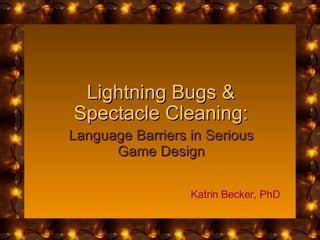Lightning Bugs & Spectacle Cleaning
•Download as PPS, PDF•
1 like•389 views
CNIE 2008: problems arise when people use different language - especially when they use the same words to mean different things
Report
Share
Report
Share

Recommended
More Related Content
Similar to Lightning Bugs & Spectacle Cleaning
Similar to Lightning Bugs & Spectacle Cleaning (20)
Making the vocabulary connection in middle schools

Making the vocabulary connection in middle schools
Six step vocabulary_instruction_revised_without_notes

Six step vocabulary_instruction_revised_without_notes
"Game Design: Creating Psychological Experiences" by Sherry Jones (Nov. 12, 2...

"Game Design: Creating Psychological Experiences" by Sherry Jones (Nov. 12, 2...
Assessment 1- Short essayInstructionsEssay Topic U.docx

Assessment 1- Short essayInstructionsEssay Topic U.docx
Assessment 1- Short essayInstructionsEssay Topic .docx

Assessment 1- Short essayInstructionsEssay Topic .docx
Different Kinds Of Essay. 8 Types of Essays in College: All You Need to Know ...

Different Kinds Of Essay. 8 Types of Essays in College: All You Need to Know ...
Analyze the impact of word choice on meaning and tone in informational text

Analyze the impact of word choice on meaning and tone in informational text
More from Katrin Becker
More from Katrin Becker (20)
Assignments that Meet the Needs of Exceptional Students without Disadvantagin...

Assignments that Meet the Needs of Exceptional Students without Disadvantagin...
4 Pillars of DGBL: A Structured Rating System for Games for Learning

4 Pillars of DGBL: A Structured Rating System for Games for Learning
The Calm and The Storm: Simulation and Games - Why All Games are Simulations ...

The Calm and The Storm: Simulation and Games - Why All Games are Simulations ...
Gamification how to gamify learning and instruction Part 1 (of 3)

Gamification how to gamify learning and instruction Part 1 (of 3)
Gamification how to gamify learning and instruction, part 2 (of 3)

Gamification how to gamify learning and instruction, part 2 (of 3)
CS Lesson: Introduction to the Java virtual Machine

CS Lesson: Introduction to the Java virtual Machine
CS: Introduction to Record Manipulation & Indexing

CS: Introduction to Record Manipulation & Indexing
Using cards games as learning objects to teach genetics

Using cards games as learning objects to teach genetics
Gamification how to gamify learning and instruction, Part 3 (of 3)

Gamification how to gamify learning and instruction, Part 3 (of 3)
Recently uploaded
Driving Behavioral Change for Information Management through Data-Driven Gree...

Driving Behavioral Change for Information Management through Data-Driven Gree...Enterprise Knowledge
Recently uploaded (20)
Understanding Discord NSFW Servers A Guide for Responsible Users.pdf

Understanding Discord NSFW Servers A Guide for Responsible Users.pdf
Workshop - Best of Both Worlds_ Combine KG and Vector search for enhanced R...

Workshop - Best of Both Worlds_ Combine KG and Vector search for enhanced R...
Handwritten Text Recognition for manuscripts and early printed texts

Handwritten Text Recognition for manuscripts and early printed texts
Boost PC performance: How more available memory can improve productivity

Boost PC performance: How more available memory can improve productivity
2024: Domino Containers - The Next Step. News from the Domino Container commu...

2024: Domino Containers - The Next Step. News from the Domino Container commu...
Tech Trends Report 2024 Future Today Institute.pdf

Tech Trends Report 2024 Future Today Institute.pdf
Connector Corner: Accelerate revenue generation using UiPath API-centric busi...

Connector Corner: Accelerate revenue generation using UiPath API-centric busi...
Strategies for Landing an Oracle DBA Job as a Fresher

Strategies for Landing an Oracle DBA Job as a Fresher
Driving Behavioral Change for Information Management through Data-Driven Gree...

Driving Behavioral Change for Information Management through Data-Driven Gree...
From Event to Action: Accelerate Your Decision Making with Real-Time Automation

From Event to Action: Accelerate Your Decision Making with Real-Time Automation
What Are The Drone Anti-jamming Systems Technology?

What Are The Drone Anti-jamming Systems Technology?
Axa Assurance Maroc - Insurer Innovation Award 2024

Axa Assurance Maroc - Insurer Innovation Award 2024
TrustArc Webinar - Unlock the Power of AI-Driven Data Discovery

TrustArc Webinar - Unlock the Power of AI-Driven Data Discovery
Automating Google Workspace (GWS) & more with Apps Script

Automating Google Workspace (GWS) & more with Apps Script
Lightning Bugs & Spectacle Cleaning
- 1. Lightning Bugs & Spectacle Cleaning: Language Barriers in Serious Game Design Katrin Becker, PhD
- 4. Step 2: about that title... The difference between the right word and almost the right word is the difference between lightning and lightning bug. Mark Twain
- 10. Whorf-Sapir and Game Design ‘ Language shapes the way we think, and determines what we can think about.’ ... ‘We dissect nature along lines laid down by our native language. Language is not simply a reporting device for experience but a defining framework for it.’ ~ Benjamin Whorf
- 11. Definitions are important. "We cannot define anything precisely! If we attempt to, we get into that paralysis of thought that comes to philosophers, who sit opposite each other, one saying to the other, Richard Feynman (1963) 'You don't know what you are talking about!' The second one says 'What do you mean by know? What do you mean by talking? What do you mean by you?', and so on."
- 16. My definitions are different from yours. Simulation is an implementation of a model: which could be a mathematical construct that bounds the possible properties and activities of the hypothetical objects being described. Which need not be restricted by the bounds of the known universe – but which still must have integral consistency.
- 19. Communication fails if we mean different things while using the same words. Comparing Conceptual Structures Terminology Attributes Same Different Same Different Consensus Experts use terminology and concepts in the same way Correspondence Experts use different terminology for the same concepts Conflict Experts use same terminology for different concepts. Contrast Experts use different terminology and different concepts Shaw, M.L.G. & Gaines, B. (1989)
- 21. The biggest problem with communication is the illusion that it has been accomplished. George Bernard Shaw
- 24. Thanks!
